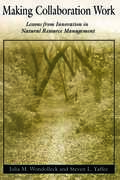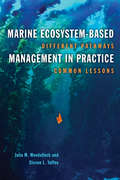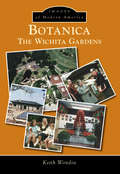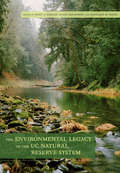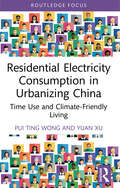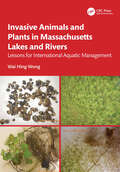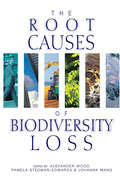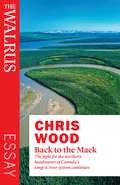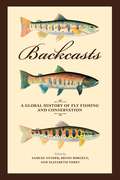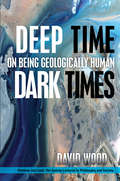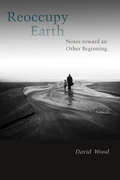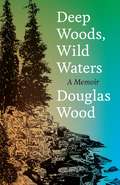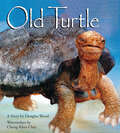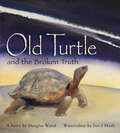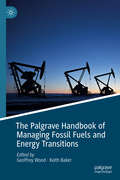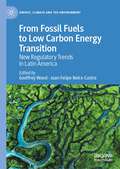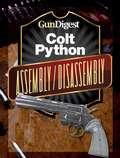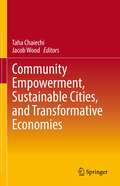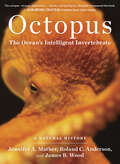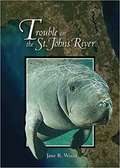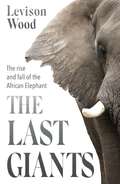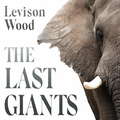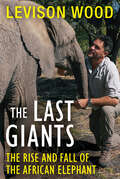- Table View
- List View
Making Collaboration Work: Lessons From Innovation In Natural Resource Management
by Julia M. Wondolleck Steven Lewis YaffeeAcross the United States, diverse groups are turning away from confrontation and toward collaboration in an attempt to tackle some of our nation's most intractable environmental problems. Government agencies, community groups, businesses, and private individuals have begun working together to solve common problems, resolve conflicts, and develop forward-thinking strategies for moving in a more sustainable direction.Making Collaboration Work examines those promising efforts. With a decade of research behind them, the authors offer an invaluable set of lessons on the role of collaboration in natural resource management and how to make it work. The book: explains why collaboration is an essential component of resource management describes barriers that must be understood and overcome presents eight themes that characterize successful efforts details the specific ways that groups can use those themes to achieve success provides advice on how to ensure accountability Drawing on lessons from nearly two hundred cases from around the country, the authors describe the experience in practical terms and offer specific advice for agencies and individuals interested in pursuing a collaborative approach. The images of success offered can provide ideas to those mired in traditional management styles and empower those seeking new approaches. While many of the examples involve natural resource professionals, the lessons hold true in a variety of public policy settings including public health, social services, and environmental protection, among others.Making Collaboration Work will be an invaluable source of ideas and inspiration for policy makers, managers and staff of government agencies and nongovernmental organizations, and community groups searching for more productive modes of interaction.
Marine Ecosystem-Based Management in Practice: Different Pathways, Common Lessons
by Julia M. Wondolleck Steven Lewis YaffeeWhat are the key ingredients of successful marine ecosystem planning? The surprising answer, according to authors Julia Wondolleck and Stephen Yaffee, is that a successful approach calls for more than just sound organizational structure and resources, but also a comfortable atmosphere of trust, understanding, and collaboration.Marine Ecosystem-Based Management in Practice is the first practical guide for the marine conservation realm. In a unique collection of case studies, the authors showcase successful collaborative approaches to ecosystem-based management. This book offers a hopeful message to policy makers, managers, practitioners, and students who will find this an indispensable guide to field-tested, replicable marine conservation management practices that work.
Botanica: The Wichita Gardens
by Keith WondraGrowing from 4 gardens in 1987 to 29 in 2015, Botanica, The Wichita Gardens has become a regional attraction. The dream of a botanical garden in Wichita started in the early 1970s with John Firsching, superintendent of landscape and forestry with the Board of Park Commissioners, and in 1987 the gardens opened on the site of Wichita's Sim Park. Images of Modern America: Botanica, The Wichita Gardens tells the story of the people, events, and stories that have shaped Botanica into Wichita's garden. Included are images of Botanica throughout the gardens' 28-year history and the earlier history of Sim Park, many of which have never been published before.
Living Without Plastic: More Than 100 Easy Swaps for Home, Travel, Dining, Holidays, and Beyond
by Christine Wong Brigette Allen“An eye-opening guide on how to lessen one’s dependence on plastics. . . . This is a clarion, convincing wake-up call to the scope of the global plastic problem and what readers can do about it. —Publishers Weekly <P><P>Embrace a plastic-free lifestyle with more than 100 simple, stylish swaps for everything from pens and toothbrushes to disposable bottles and the 5 trillion plastic bags we use—and throw out—every year. Use a natural loofah, not a synthetic sponge Buy milk in glass bottles or make homemade nut milk Opt for a waste-free shampoo bar Skip the printed receipt and opt for an email instead Wrap gifts beautifully with cloth <P><P>Organized into five sections—At Home, Food & Drink, Health & Beauty, On the Go, and Special Occasions—Living Without Plastic is a cover-to-cover collection of doable, difference making solutions, including a 30-Day Plastic Detox Program.
The Environmental Legacy of the UC Natural Reserve System
by Kathleen M. Wong Peggy L. Fiedler Susan Gee RumseyThe UC Natural Reserve System, established in 1965 to support field research, teaching, and public service in natural environments, has become a prototype of conservation and land stewardship looked to by natural resource managers throughout the world. From its modest beginnings of seven sites, the UC NRS has grown to encompass more than 750,000 wildland acres. This book tells the story of how a few forward-thinking UC faculty, who'd had their research plots and teaching spots destroyed by development and habitat degradation, devised a way to save representative examples of many of California's major ecosystems. Working together with conservation-minded donors and landowners, with state and federal agencies, and with land trusts and private conservation organizations, they founded what would become the world's largest university-administered natural reserve system--a legacy of lasting significance and utility. This lavishly illustrated volume, which includes images by famed photographers Ansel Adams and Galen Rowell, describes the natural and human histories of the system's many reserves. Located throughout California, these wildland habitats range from coastal tide pools to inland deserts, from lush wetlands to ancient forests, and from vernal pools to oak savannas. By supporting teaching, research, and public service within such protected landscapes, the UC NRS contributes to the understanding and wise stewardship of the Earth.
Residential Electricity Consumption in Urbanizing China: Time Use and Climate-Friendly Living (Routledge Focus on Energy Studies)
by Pui Ting Wong Yuan XuThis book forges a link between residential CO2 emissions and time use, focussing on China as a key case study. To provide a better understanding of the energy implications of the lifestyle differences between urban and rural China, Pui Ting Wong and Yuan Xu utilise time-use methodology as an alternative way to explore the links between individual lifestyle and residential electricity consumption. They begin by examining how Chinese citizens divide their time between daily activities, highlighting patterns around indicators including age, gender, education, and economic status. They go on to quantify CO2 intensities of these time-use activities. Through this linkage, this book presents an alternative strategy for climate-friendly living, highlighting the ways in which urban planning can be deployed to help individuals adapt their time-use patterns for CO2 mitigation. Providing a novel contribution to the growing literature on residential electricity consumption, Residential Electricity Consumption in Urbanizing China will be of great interest to scholars of climate policy, energy studies, time use, and urban planning.
Invasive Animals and Plants in Massachusetts Lakes and Rivers: Lessons for International Aquatic Management
by Wai Hing WongThere is a growing demand for appropriate management of aquatic invasive species in lakes and rivers worldwide. This book covers biology, invasion ecology, sightings, and control techniques of 4 invasive animals and 15 invasive plants in Massachusetts lakes and rivers. It provides valuable information on their biological characteristics and potential expansion pathways, as well as monitoring and management, including alternative management tools using updated biological, chemical, and mechanical methods. The book also includes the regulation of invasive species management to allow resource managers, biologists, practitioners, volunteers, and students a better understanding of compliance and enforcement with environmental law. An example of successful management is highlighted for each invasive species. Invasive Animals and Plants in Massachusetts Lakes and Rivers is the first book to provide comprehensive and systematic coverage and illustrations for both freshwater invasive animals and plants. Although focussing on Massachusetts, it will provide readers with the bigger picture on multiple invasive species, from prevention, early detection, control, ecological restoration, to public education. Natural resource managers in Massachusetts and surrounding states will glean the detailed and valuable information they need to learn and use to prevent and manage freshwater invasive species in the field.
Permafrost Hydrology
by Ming-Ko WooPermafrost Hydrology systematically elucidates the roles of seasonally and perennially frozen ground on the distribution, storage and flow of water. Cold regions of the World are subject to mounting development which significantly affects the physical environment. Climate change, natural or human-induced, reinforces the impacts. Knowledge of surface and ground water processes operating in permafrost terrain is fundamental to planning, management and conservation. This book is an indispensable reference for libraries and researchers, an information source for practitioners, and a valuable text for training the next generations of cold region scientists and engineers.
The Root Causes of Biodiversity Loss
by Alexander Wood Pamela Stedman-Edwards Johanna MangThe world is losing species and biodiversity at an unprecedented rate. The causes go deep and the losses are driven by a complex array of social, economic, political and biological factors at different levels. Immediate causes such as over-harvesting, pollution and habitat change have been well studied, but the socioeconomic factors driving people to degrade their environment are less well understood. This book examines the underlying causes. It provides analyses of a range of case studies from Brazil, Cameroon, China, Danube River Basin, India, Mexico, Pakistan, Philippines, Tanzania and Vietnam, and integrates them into a new and interdisciplinary framework for understanding what is happening. From these results, the editors are able to derive policy conclusions and recommendations for operational and institutional approaches to address the root causes and reverse the current trends. It makes a contribution to the understanding of all those - from ecologists and conservationists to economists and policy makers - working on one of the major challenges we face.
Back to the Mack
by Chris WoodBack to the Mack is an ebook by award-winning journalist and author Chris Wood. It contains his seminal story about the Mackenzie River, "The Last Great Water Fight," first featured in the October 2010 issue of The Walrus. The ebook also includes "Back to the Mack," in which Wood returns to the Mackenzie four years after his original story and chronicles the development of natural resources affecting both the river and the extensive ecosystems and communities it supports. These two articles also serve as companion content to the brand-new original documentary http://thewalrus.ca/cold-amazon, produced by the Walter and Duncan Gordon Foundation. Cold Amazon will be available to view for free as of March 17 at http://thewalrus.ca/cold-amazon.
Backcasts: A Global History of Fly Fishing and Conservation
by Chris Wood Jen Corrinne Brown Elizabeth Tobey Samuel Snyder Bryon Borgelt"Many of us probably would be better fishermen if we did not spend so much time watching and waiting for the world to become perfect."-Norman Maclean Though Maclean writes of an age-old focus of all anglers--the day's catch--he may as well be speaking to another, deeper accomplishment of the best fishermen and fisherwomen: the preservation of natural resources. Backcasts celebrates this centuries-old confluence of fly fishing and conservation. However religious, however patiently spiritual the tying and casting of the fly may be, no angler wishes to wade into rivers of industrial runoff or cast into waters devoid of fish or full of invasive species like the Asian carp. So it comes as no surprise that those who fish have long played an active, foundational role in the preservation, management, and restoration of the world's coldwater fisheries. With sections covering the history of fly fishing; the sport's global evolution, from the rivers of South Africa to Japan; the journeys of both native and nonnative trout; and the work of conservation organizations such as the Federation of Fly Fishers and Trout Unlimited, Backcasts casts wide. Highlighting the historical significance of outdoor recreation and sports to conservation in a collection important for fly anglers and scholars of fisheries ecology, conservation history, and environmental ethics, Backcasts explores both the problems anglers and their organizations face and how they might serve as models of conservation--in the individual trout streams, watersheds, and landscapes through which these waters flow.
Deep Time, Dark Times: On Being Geologically Human (Thinking Out Loud)
by David WoodThe new geological epoch we call the Anthropocene is not just a scientific classification. It marks a radical transformation in the background conditions of life on Earth, one taken for granted by much of who we are and what we hope for. Never before has a species possessed both a geological-scale grasp of the history of the Earth and a sober understanding of its own likely fate. Our situation forces us to confront questions both philosophical and of real practical urgency. We need to rethink who “we” are, what agency means today, how to deal with the passions stirred by our circumstances, whether our manner of dwelling on Earth is open to change, and, ultimately, “What is to be done?” Our future, that of our species, and of all the fellow travelers on the planet depend on it.The real-world consequences of climate change bring new significance to some very traditional philosophical questions about reason, agency, responsibility, community, and man’s place in nature. The focus is shifting from imagining and promoting the “good life” to the survival of the species. Deep Time, Dark Times challenges us to reimagine ourselves as a species, taking on a geological consciousness. Drawing promiscuously on the work of Nietzsche, Heidegger, Foucault, Derrida, Deleuze, and other contemporary French thinkers, as well as the science of climate change, David Wood reflects on the historical series of displacements and de-centerings of both the privilege of the Earth, and of the human, from Copernicus through Darwin and Freud to the declaration of the age of the Anthropocene. He argues for the need to develop a new temporal phronesis and to radically rethink who “we” are in respect to solidarity with other humans, and responsibility for the nonhuman stakeholders with which we share the planet. In these brief, lively chapters, Wood poses a range of questions centered on our individual and collective political agency. Might not human exceptionalism be reborn as a sort of hyperbolic responsibility rather than privilege?
Reoccupy Earth: Notes toward an Other Beginning (Groundworks: Ecological Issues in Philosophy and Theology)
by David WoodHabit rules our lives. And yet climate change and the catastrophic future it portends, makes it clear that we cannot go on like this. Our habits are integral to narratives of the good life, to social norms and expectations, as well as to economic reality. Such shared shapes are vital. Yet while many of our individual habits seem perfectly reasonable, when aggregated together they spell disaster. Beyond consumerism, other forms of life and patterns of dwelling are clearly possible. But how can we get there from here? Who precisely is the ‘we’ that our habits have created, and who else might we be? Philosophy is about emancipation—from illusions, myths, and oppression. In Reoccupy Earth, the noted philosopher David Wood shows how an approach to philosophy attuned to our ecological existence can suspend the taken-for-granted and open up alternative forms of earthly dwelling. Sharing the earth, as we do, raises fundamental questions about space and time, place and history, territory and embodiment—questions that philosophy cannot directly answer but can help us to frame and to work out for ourselves. Deconstruction exposes all manner of exclusion, violence to the other, and silent subordination. Phenomenology and Whitehead’s process philosophy offer further resources for an ecological imagination. Bringing an uncommon lucidity, directness, and even practicality to sophisticated philosophical questions, Wood plots experiential pathways that disrupt our habitual existence and challenge our everyday complacency. In walking us through a range of reversals, transformations, and estrangements that thinking ecologically demands of us, Wood shows how living responsibly with the earth means affirming the ways in which we are vulnerable, receptive, and dependent, and the need for solidarity all round.If we take seriously values like truth, justice, and compassion we must be willing to contemplate that the threat we pose to the earth might demand our own species’ demise. Yet we have the capacity to live responsibly. In an unfashionable but spirited defense of an enlightened anthropocentrism, Wood argues that to deserve the privileges of Reason we must demonstrably deploy it through collective sustainable agency. Only in this way can we reinhabit the earth.
Deep Woods, Wild Waters: A Memoir
by Douglas WoodWait, young Douglas’s grandfather says as the bobber twitches on the surface of Little Lake. Be patient. And so begins an encounter with the promise and wonder of nature that will last a lifetime. Deep Woods, Wild Waters traces the winding path that carried Douglas Wood from one wonder to the next, through a landscape of rocks, woods, and waters, with stops along the way for questions and reflections that link human nature to the larger mysteries of the natural world.Like life itself, the author’s way is not linear. One landmark leads back to a favorite campsite, another prompts him to consider the “gospel of rocks,” another launches him into the wilderness beyond the stars—a contemplation of time and space and humanity’s place in all of it. The creator of thirty-four books, including the classic Old Turtle, and an expert woodsman and wilderness canoe guide, Wood brings all his storytelling and bushwhacking skills to bear as he takes us hurtling down wild rapids, crossing stormy lakes, or simply navigating the treacherous currents and twisty trails of everyday life. A warm, generous, and knowing guide, Wood maps a journey that, as he says, “anyone can take, through a landscape anyone can know.” Turning the pages, hiking the portages, running the rapids, or scanning the wild country from high promontory, he invites us to say, in a soul-satisfying moment of recognition, “I know that place.”
Old Turtle
by Douglas WoodExperience the wisdom of Old Turtle, the bestselling fable that explores society, the environment, and the spirituality they share.Who is God?Is He a wind that is never still?Is He a rock that never moves?Is He high above or here among us?Venerable Old Turtle answers quietly: God is all of these things.Old Turtle first burst upon the publishing scene in 1992, and it was instantly recognized as a classic fable about ecology, peace, and the interconnectedness of all beings. Simple yet profound, it has since brought hope and inspiration to children and adults around the world.
Old Turtle and the Broken Truth
by Douglas WoodPowerhouse team Douglas Wood and Jon J Muth present a sequel to Old Turtle, the award-winning wisdom tale of peace and love for the earth.Seekers of all ages have been inspired by the stirring message of Old Turtle, the beloved, award-winning wisdom tale of peace. Now Old Turtle returns in a timeless story about love, acceptance, and the nature of truth.Long ago, as truth descended onto earth, it split in two: one piece landing among the people and the other blazing through the sky. When the people discover the piece of truth, it gives them strength and happiness. But over time, it turns them arrogant and greedy. They do not share their truth with others, wars rage on, and the earth begins to suffer. Then a Little Girl eager for change journeys to find Old Turtle, seeking the precious piece of wisdom that will mend the people's broken truth, making it -- and them -- whole once again.Douglas Wood's stirring and eloquent fable, soulfully illustrated in luminous watercolor by Jon J Muth, offers readers of all ages inspiration, hope, and a healing vision of peace.
The Palgrave Handbook of Managing Fossil Fuels and Energy Transitions
by Geoffrey Wood Keith BakerThis Handbook is the first volume to comprehensively analyse and problem-solve how to manage the decline of fossil fuels as the world tackles climate change and shifts towards a low-carbon energy transition. The overall findings are straight-forward and unsurprising: although fossil fuels have powered the industrialisation of many nations and improved the lives of hundreds of millions of people, another century dominated by fossil fuels would be disastrous. Fossil fuels and associated greenhouse gas emissions must be reduced to a level that avoids rising temperatures and rising risks in support of a just and sustainable energy transition. Divided into four sections and 25 contributions from global leading experts, the chapters span a wide range of energy technologies and sources including fossil fuels, carbon mitigation options, renewables, low carbon energy, energy storage, electric vehicles and energy sectors (electricity, heat and transport). They cover varied legal jurisdictions and multiple governance approaches encompassing multi- and inter-disciplinary technological, environmental, social, economic, political, legal and policy perspectives with timely case studies from Africa, Asia, Australia, Europe, North America, South America and the Pacific. Providing an insightful contribution to the literature and a much-needed synthesis of the field as a whole, this book will have great appeal to decision makers, practitioners, students and scholars in the field of energy transition studies seeking a comprehensive understanding of the opportunities and challenges in managing the decline of fossil fuels.
From Fossil Fuels to Low Carbon Energy Transition: New Regulatory Trends in Latin America (Energy, Climate and the Environment)
by Geoffrey Wood Juan Felipe Neira-CastroFocusing on five key themes - hydrocarbons, electricity, mining, social license to operate, and arbitration/dispute resolution- via in-depth country and regional case studies, this book seeks to capture the contrasting and sometimes conflicting trends in energy governance in Latin America as it wrestles with a dependence on fossil fuels whilst shifting toward a low carbon future. Energy transition continues to sit at the centre of the Latin American policy debate as the world continues to push for carbon neutrality by 2050. Latin America is undergoing a renewable energy transition, with substantial reserves (solar, wind, hydro, geothermal) and many countries in the region setting ambitious renewable energy policies, laws, and regulations to address climate change. However, recent initiatives to promote renewables must be placed in context. Historically, Latin America has developed and improved its economic and social standards due primarily to an economy based on the extractive industries and fossil fuels. This places renewables at the crossroads of multiple drivers, as the region seek to ensure security of supply, attract investment, and facilitate a low carbon energy transition.
Gun Digest Colt Python Assembly/Disassembly Instructions
by J. B. WoodThis short e-book teaches you how to take apart and reassemble your Colt Python with confidence. Thanks to clear Assembly/Disassembly instructions and crisp photography - aided by gun expert J.B. Wood's sage advice - you'll save an expensive trip to the gunsmith by getting to know your gun inside and out!
Community Empowerment, Sustainable Cities, and Transformative Economies
by Jacob Wood Taha ChaiechiThis edited volume presents the conference papers from the 1st International Conference on Business, Economics, Management, and Sustainability (BEMAS), organized by the Centre for International Trade and Business in Asia (CITBA) at James Cook University.This book argues that the orthodox methods of external risks, climate change adaptation plans, and sustainable economic growth in cities are no longer adequate. These methods, so far, have not only ignored the ongoing structural changes associated with economic development but also failed to account for evolving industries’ composition and the emergence of new comparative advantages and skills. Specifically, this book looks at the vulnerable communities and exposed areas, particularly in urban areas, that tend to experience higher susceptibility to external risks (such as climate change, natural disasters, and public health emergencies) have been largely ignored in incremental adaptation plans. Vulnerable communities and areas not only require different adaptive responses to climate risk but also possess unlocked adaptive capacity that can motivate different patterns of sustainable development to achieve the goals of the 2030 Agenda. It is essential, therefore, to view transformative growth and fundamental reorientation of economic resources as integral parts of the solution. Social disorganisation and vulnerability are other undesired outcomes of the unpredictable and widespread external economic shocks. This is due to a sudden and tough competition between members of society to acquire precious resources, most of which may be depleted during unprecedented events such as natural disasters or pandemics resulting in an even more chaotic and disorganised conditions.
Octopus: The Ocean's Intelligent Invertebrate
by James B. Wood Roland C. Anderson Jennifer A. MatherThe visually arresting and often misunderstood octopus has long captured popular imagination. With an alien appearance and an uncanny intellect, this exceptional sea creature has inspired fear in famous lore and legends—from the giant octopus attack in 20,000 Leagues Under the Sea to Ursula the sea witch in The Little Mermaid. Yet its true nature is more wondrous still. After decades of research, the authors reveal a sensitive, curious, and playful animal with remarkable intelligence, an ability to defend itself with camouflage and jet propulsion, an intricate nervous system, and advanced problem-solving abilities. In this beautifully photographed book, three leading marine biologists bring readers face to face with these amazingly complex animals that have fascinated scientists for decades. From the molluscan ancestry of today’s octopus to its ingenious anatomy, amazing mating and predatory behaviors, and other-worldly relatives, the authors take readers through the astounding life cycle, uncovering the details of distinctive octopus personalities. With personal narratives, underwater research, stunning closeup photography, and thoughtful guidance for keeping octopuses in captivity, Octopus is the first comprehensive natural history of this smart denizen of the sea.
Trouble On The St. Johns River
by Jane R. WoodIn Trouble on the St. Johns River, the Johnson kids Joey, Bobby and Katy are up to their adventurous ways again. But this time, instead of exploring history, they re making it! Joey and Bobby start their summer vacation by setting out for their favorite fishing pond, but end up leading a crusade to clean up the environment instead. Finding the pond covered with green muck and dead fish, the brothers decide to do something about it. That leads to a close encounter with a manatee, a visit to a center that rehabilitates injured sea turtles, and a boat tour on the St. Johns River. What they learn through these experiences inspires them to create The Greenies and chart a course of action that captures the attention of many, including a local TV station. By the end of the story, Joey, who thought there was nothing kids could do to make a difference, realizes that perhaps they are the very ones who can. It s a story of awakening that will inspire young readers to become more aware of their environment and give them some ideas on how to preserve it.
The Last Giants: The Rise and Fall of the African Elephant
by Levison Wood*Levison Wood's documentary series on WALKING WITH ELEPHANTS is available to watch now on Channel 4*This book comes at a critical time. Fifty years ago, Africa was home to just over 1.3 million elephants, but by 1990 the number had halved. Meanwhile in the span of a lifetime, the human population has more than doubled. In Levison Wood's The Last Giants, he explores the rapid decline of one of the world's favourite animals. Filled with stories from his own time spent travelling with elephants in Africa, and documenting their migration in his Channel 4 series, Walking With Elephants, the book is a passionate wake-up call for this endangered species we take for granted. The Last Giants was written to inspire us all to act - to learn more and help save the species from permanent extinction.
The Last Giants: The Rise and Fall of the African Elephant
by Levison WoodThis book comes at a critical time. Thirty years ago, Africa was home to a million elephants, today the figure stands at less than half that. Meanwhile in the span of a lifetime, the human population has more than doubled. In Levison Wood's The Last Giants, he explores the rapid decline of one of the world's favourite animals. Filled with stories from his own time spent travelling with elephants in Africa, the book is a passionate wake-up call for this endangered species we take for granted. The Last Giants was written to inspire us all to act - to learn more and help save the species from permanent extinction.(P) 2020 Hodder & Stoughton Ltd
The Last Giants: The Rise and Fall of the African Elephant
by Levison WoodFrom the award-winning explorer, “an entertaining summary of what we know about the elephant, and a call to change our behavior to ensure its survival” (Daily Mail).The Last Giants satisfies British explorer Levison Wood’s lifelong desire to learn more about the majestic African elephant. These giants trek through some of Africa’s most magnificent landscapes as they go in search of life-giving waters and pastures. El Nino’s droughts and an insatiable ivory trade have cut African elephant numbers by a third in the last decade alone, and if elephants disappear entirely, Africa’s entire ecosystem could collapse. But Botswana has become a safe haven, where one-sixth of the world’s elephants now reside. Each year their numbers grow and an incredible migration takes place, which Wood witnesses and records. He teams up with local trackers to gain insight into how this iconic species survives, camps out in the wild, meets the people and tribes living on the migration’s path, and joins the park rangers whose job it is to protect these land goliaths, equipped with his “good eye for detail and better ear for dialogue” (The Wall Street Journal).“Adventurer Wood followed elephants on a 650-mile migration across Botswana for a British television program. This fascinating companion volume to that series examines the past, present, and future of the African elephant.” —Library Journal (starred review)“A smart, inviting portrait of elephants from a keen-eyed observer.” —Kirkus Reviews“A rewarding look at the habits and habitats of the African elephant . . . Comprehensively yet accessibly conveying Wood’s lifelong fascination with African elephants, his discussion will appeal to anyone keen on learning more about them.” —Publishers Weekly
